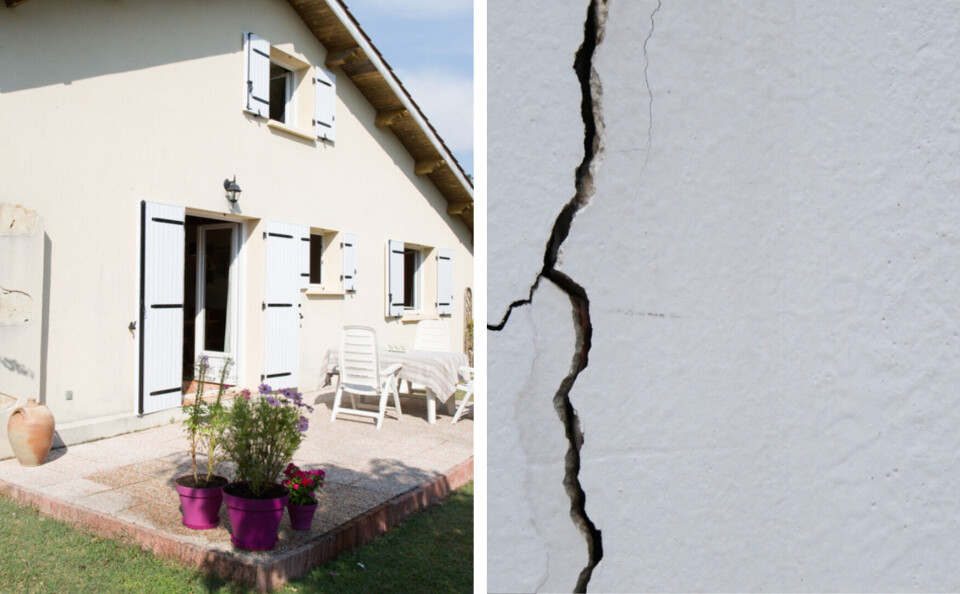-
La Voie Bleue: European Cycle Route of the Year is in France
700km bike path linking Luxembourg and Lyon has been crowned winner of the 2026 title
-
Before and after: Garonne river floods in south-west France
Satellite images show extent of flooding from back-to-back storms in February
-
Home insurance increases expected in France after floods
Compensation costs for the recent storms and flooding across the west and south-west is estimated to be in the billions of euros
1,000 ‘drought disaster zones’ named in France: what to do if affected
The damage can cover cracks in walls and foundations due to movements in the ground

More than 1,000 communes have been declared drought ‘natural disaster zones’ in France after being affected by the weather phenomenon in 2022.
The list, published last Friday in the Journal Officiel (the way that France officialises new laws and government decrees) shows the communes which have been classed as affected. This starts a time countdown for insurance claims.
For those in the communes, being put on the list means insurance claims for damage caused by droughts can be made (natural disaster damage is always included in home multirisques insurance policies).
The damage can cover cracks in walls and foundations due to movements in the ground from the drought conditions.
Authorities undertake annual checks
Authorities periodically test communes to see if they have been affected by previous droughts to be added to the list.
Specifically, the government looks for “differential ground movements due to drought and soil rehydration” according to the Journal Officiel - that is, when soil has dried out in the heat and subsequently been moistened by rains, causing expansion.
More than 10 million homes are said to be at risk of this in France.
The current wave of testing applies to the drought season of 2022, particularly in the summer months, relating to homes that have been affected by ‘shrinkage’ of the ground due the ground movements mentioned above. Soils with a large proportion of clay are most commonly affected by this.
The full list of communes can be found on the Journal Officiel’s website.
To search for your commune, you can use your device’s search function (usually activated by pressing the ‘ctrl’ and ‘F’ keys on a computer simultaneously) and then typing in the name of your commune.
This is because there are more than 1,000 communes classed as ‘natural disaster zones’ which are eligible for compensation.
Make sure however that your commune falls in Annexe I (those added to the list after being tested) and not Annexe II (those tested but not put on the disaster list).
How can I claim on my insurance if my home was damaged?
If your commune is on the list of disaster zones, it means you could be eligible for compensation provided your home was damaged during 2022’s droughts, however you should check the specific eligibility period mentioned in the table under your commune.
If you have a typical assurance multirisques habitation home insurance policy you will be able to claim compensation.
To do so, you should contact your insurer as soon as possible to make a claims process, and no more than 30 days after publication in the Journal Officiel – prior to 2023 the limit to make a claim was 10 days but this has been extended to give people more time.
You can make the claim by email, phone, or text to your insurer, although you should make sure to get proof of your claim being submitted via a lettre recommandée avec accusé de réception (an acknowledgement of receipt sent through the mail).
Next, your insurer will specify what they need from you (usually photos or videos of the damage), and your compensation should arrive within three months.
A full overview of how to make a claim can be read in our article below.
Read more: France’s ‘catastrophe naturelle’ insurance system: how to claim
Is it the same for second-home owners?
The same rules apply for second home owners, not just for main residencies. You can find out more information on our last article on the matter, when the Journal Officiel updated the list in May 2023.
The main difference is that second-home owners will not need to visit their property in person, but instead an expert will be sent to assess their home for them. No extension is given on the submission deadline, however.
Related articles:
MPs back compensating homeowners in France for drought damage
Drought damage claims could get easier due to reforms and Météo-France
























